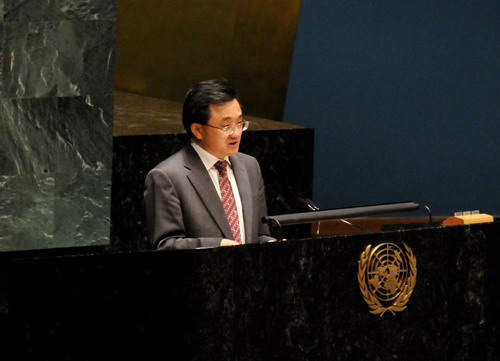| Statement by Ambassador Liu Zhenmin on Agenda Item 43 "Return or Restitution of Cultural Property to the Countries of Origin" at the 64th Session of the General Assembly |
| 2009-11-16 12:33 |
|
New York, 16 November 2009 Mr. President: The Chinese delegation welcomes the report submitted by the Secretary General under the agenda item "Return or Restitution of Cultural Property to the Countries of Origin", and supports the draft resolution submitted by the delegation of Greece under this agenda item.
(Photographer: BAI Jie/Xinhua News Agency) As symbols of identity of a nation or a people, cultural property represents a valuable asset of human civilization. Illicit appropriation of and trafficking in cultural property is a sacrilege to history and civilization. While enjoying broad consensus of the international community, protecting cultural heritage and promoting the restitution of cultural property to the countries of origin are inalienable and fundamental cultural rights of the people of countries of origin, as well as cultural responsibilities incumbent on all governments. In recent years, the question of returning cultural property has received increasing attention from countries. China supports countries of origin in seeking the return of cultural property of spiritual and cultural value, and supports the General Assembly resolutions on this subject matter and the ECOSOC resolution entitled "Protection against Trafficking in Cultural Property". We would like to reiterate the need for the international community to prevent and combat all aspects of trafficking in cultural property, including the transfer, through auction or other means, of cultural property which were illegally removed from its countries of origin . Mr. President Strengthening international cooperation is an effective way to prevent and combat trafficking in cultural property. States should comply in good faith with international legal frameworks and principles relating to the issue, carry out active cooperation with competent UN bodies and international organizations in a joint effort to combat smuggling and trafficking in cultural property, and enhance bilateral and multilateral cooperation in promoting the return of cultural property. China commends the efforts made in this regard by UNESCO as an important body engaged in the protection of cultural resources globally. We support UNESCO in expanding advocacy to raise public awareness, in alerting governments, civil society, academic institutions, museums, and art market actors to the harm resulting from trafficking in and transfer of cultural property illicitly taken abroad, and in advancing bilateral and international cooperation in the interest of the return of cultural property. Mr. President, The Chinese government attaches great importance to the protection of cultural heritage. We have put in place a legal and regulatory system with the "Cultural Relics Protection Law" as the pivot. Positive results have been achieved in areas of inventory archiving, security and safeguard building, market management, and publicity campaigning. China is now party to the following international conventions: "Convention Concerning the Protection of the World Cultural and Natural Heritage", "Convention on the Means of Prohibiting and Preventing the Illicit Import, Export, and Transfer of Ownership of Cultural Property", "Convention on Stolen or Illegally Exported Cultural Objects", and "Convention for the Protection of Cultural Property in the Event of Armed Conflict". China took an active part in the drafting of UNESCO's "Declaration of Principles Relating to Cultural Objects Displaced in Connection with Second World War". It has signed with many countries bilateral agreements on the prevention of illicit appropriation, excavation, and entry and exit of cultural objects, and has, on multiple occasions via international cooperation, successfully sought and retrieved such objects illegally transported overseas. For a long period beginning in mid-19th century, the western powers, in a succession of wars of aggression against China, had plundered and looted countless Chinese cultural relics, including numerous cultural treasures from Yuan Ming Yuan Summer Palace. These cultural relics should be returned to China. China insists on its right to seek the return of cultural relics that have been illegally taken abroad. It opposes to auctions of cultural relics illegally taken from China, including treasures from Yuan Ming Yuan Summer Palace. We believe that such auctions run counter to the underlying spirit of relevant international treaties and UN resolutions, and are serious infringements of China's cultural rights and interests. China will continue to actively participate in UNESCO's activities in promoting the return of cultural property to its countries of origin, and seek appropriate solutions in this regard, thus making our due contribution to the protection of international cultural heritage. Thank you, Mr. President. |
| |||||||||||||
| |||||||||||||
